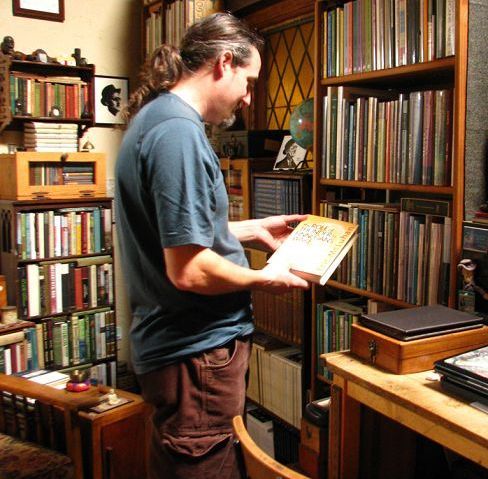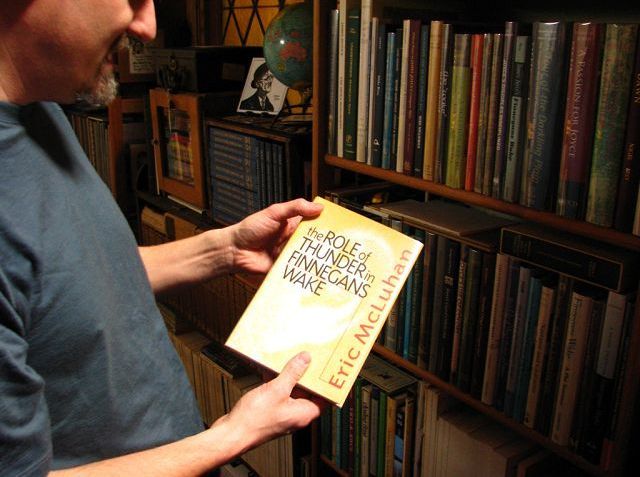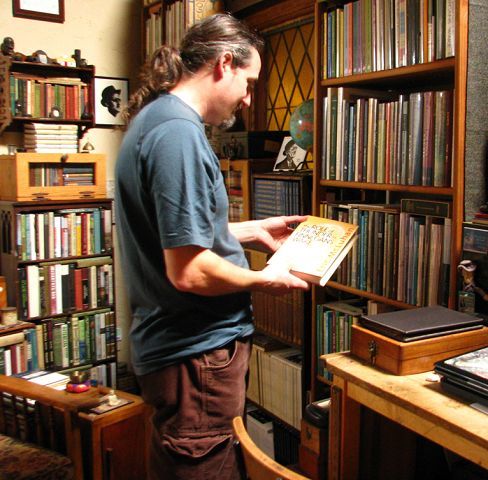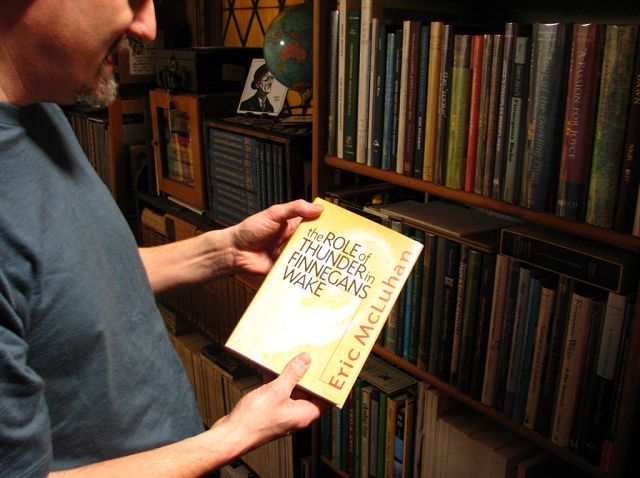Caught in the Wake: Daniel Wenzel
Youll either hate it, or it will consume you.
For Daniel Wenzel, a bookseller living just outside of Killbuck, one book has very nearly consumed not only him, but also, by association and love, his business partner and wife, Leslie McKelley.
Walk into the couples solid-panel yurt (think a hobbit house nestled into the woods instead of a hillside), and youre met with Wenzels library, inhabiting a sizable portion of the dwellings 735 square (or, as McKelley says, round) feet. Nearly 600 of those books are centered around one subject-- in fact, one book--James Joyces cyclical, idiosyncratic enigma, Finnegans Wake. And lest you hasten to cry TYPO! rest assured; Joyce left out the apostrophe intentionally. If you want to know why, theres probably an entire book about it. And if there is, Wenzel can likely tell you how to find it.
Thats because Daniel Wenzel falls into the category of one who has been consumed by the Wake, as its known, the Irish authors final work, first published in its entirety in 1939.
But Wenzel wasnt always a fan, or, as the books scholars are dubbed a Wakian. It took years for him to appreciate the book he had picked up and put down several times. As with many things, it started with a bit of sibling rivalry with Wenzels older brother, Paul Wenzel.
I idolized and hated him at the same time, Wenzel says. He was better in sports and always finding new music and books. He told me about Joyces Ulysses when I was a sophomore in high school, said it was difficult but he enjoyed it.
Later, one of Wenzels teachers at Walsh College, the late Brother Joseph Power, professor of English Language and Literature who studied at St. Catherines College, Oxford, under J.R.R. Tolkien and C.S. Lewis, assigned students to read a piece from Dubliners, Joyces 1914 collection of short stories. The tale was Araby, a glimpse into the mind of a young boy faced with disappointment after his idealistic view of love and location are destroyed.
Something about that story struck home, Wenzel says. So I read the rest of Dubliners and eventually moved on to Ulysses.
Wenzel thought that might prepare him for the Wake, so he picked it up. And didnt understand a word of it.
Wenzel isnt the only one. The Wake is touted as one of the most difficult books to read, filled with wordplay, concocted languages, sentence fragments and dreams within dreams. Take, for example, this line from the first page:
The fall (bababadalgharaghtakamminarronnkonnbronntonner
ronntuonnthunntrovarrhounawnskawntoohoohoordenenthurnuk!) of a once wallstrait oldparr is retaled early in bed and later
on life down through all christian minstrelsy.
If you need an interpretation for that huge string of letters in the middle, have no fear. Its the sound of thunder, and theres an entire book on that subject alone: The Role of Thunder in Finnegans Wake, by Eric McLuhan. Wenzel owns it.
Eventually, though, Wenzel did read the Wake. When asked how long it took, he says about six months. McKelley disagrees.
He has never stopped, she says, which actually rings true. As if on a mission to unlock its mystery, Wenzel began collecting all things Joyce, and then, because yurt space is at a premium, sharpened his focus, narrowing it down further and further to just Finnegans Wake, eventually amassing a collection of nearly 800 books on the topic.
That collection was reduced by about 140 titles recently when Wenzel and McKelley hand-delivered a portion of Wenzels personal collection to Aedin Clements, Irish Studies Librarian and head of rare books and special collections at the Hesburgh Libraries at the University of Notre Dame. Clements says, in her lovely Irish lilt, that the library attracts people from all over who want to study Irish fiction and will spend a week or two researching in that collection alone.
The delivery came about after a university professor asked Clements to purchase one of a 63-volume set titled Finnegans Wake. Book 2, Chapter 2: a facsimile of drafts, typescripts and proofs. Vol. 2. One of only 250 published. A nearly impossible task.
Until she found Wenzel.
Id located a description on AbeBooks and called about it, Clements says. I expected to have to explain exactly what I wanted, but Daniel confirmed without having to check. I happen to know Finnegans Wake, he said.
She was dumbfounded that I actually had what she was looking for, Wenzel remembers. I was dumbfounded that Notre Dame didnt have the James Joyce archives.
That first exchange back in 2009 led to the purchase of not just that volume, but half of the set. In January of this year, the remaining volumes plus 140 titles from Wenzels personal collection also found a new home at Hesburgh Libraries, including one specialized piece titled ?amsolookly kersse?: Clothing in Finnegans Wake.
It was kind of hard for Wenzel to let go, but he knew it was time.
After 20 years, I was getting somewhat tired of the chase, Wenzel says. My wish list had shrunk from page-after-page to 30-40 items.
So Wenzel and McKelley packed up the treasures and trekked to Notre Dame.
Over the seven years Ive been here, I can name the large collections Ive bought, and Daniels is definitely one of them, Clements says. Daniel has taken us in a very good step towards having the best print collection on Joyce we can have.
Wenzel is delighted that the books are in good hands.
They went where they needed to be, Wenzel says. From sitting on a shelf in a yurt in Holmes County to where people can see and study them.
And just like the never-ending cycle of Finnegans Wake, that portion of Wenzels book collection will live on and on.
Theyre in a better place, Wenzel says, a place where they will be read and studied by those who, like Wenzel, have been consumed by one of the most beloved and confusing pieces of literature in the world.








